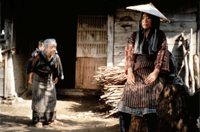The Ballad of Narayama opens to an aerial shot of a vast, frozen wilderness on a remote mountainous region in Northern Japan at an inexact date of a hundred years ago. Along the base of the mountain is an isolated, snow covered feudal village, where a family matriarch Orin (Sumiko Sakamoto) lives with her widowed son, Tatsuhei (Ken Ogata), his children, Kesakichi (Seiji Kurasaki) and Tomekichi (Kaoru Shimamori), and his younger brother, Risuke (Tonpei Hidari). The climate is cruel and devastating, and the settlers have adopted austere laws to ensure the survival of the village. Orin is 69 years old, and tribal customs dictate that Tatsuhei take her to the sacred mountain of Narayama when she turns 70, where her soul can be laid to rest. Tatsuhei refuses to accept Orin’s inevitable destiny, rationalizing that her vitality and resourcefulness make her an indispensable member of the household. Despite Tatsuhei’s protests, Orin continues to remind him of his obligations to his ancestors and to the community. “A law is a law. Kindness has nothing to do with it”, she explains. Orin arranges a second marriage for Tatsuhei with a widow named Tamayan (Takejo Aki) from an adjacent village, and teaches her to assume her domestic responsibilities. The family also gains an unexpected member when the insolent and promiscuous Kesakichi brings home his immature, dishonored lover, Matsu (Junko Takada). But Matsu’s allegiance to her impoverished family supersedes her responsibilities to her new family, and she begins to steal food from Orin and Tamayan’s kitchen to bring home to her father, Amaya (Akio Yokoyama). One evening, the villagers raid Amaya’s house and discover the family’s rampant theft of other farms. Determined to exact severe punishment for their crimes, the village denounces Amaya’s family, and Orin delivers Matsu into the hands of the vengeful community. With the order of the house restored, Orin resumes her preparations for her final journey to Narayama.
The Ballad of Narayama is a brutal and haunting, yet ultimately poignant meditation on the nature of existence and death. Through the resilience and devotion of the proud Orin, Shohei Imamura illustrates the human capacity for innate dignity and perseverance despite the cruelty of life and the certainty of death. By juxtaposing the primal and savage actions of animals in the wilderness to the actions of the villagers, Imamura reflects the reduction of human behavior to the basest instincts of self preservation: a bird of prey carries away Tatsuhei’s hunted game; two snakes perform their mating ritual against Kesakichi and Matsu’s sexual encounter in the woods; an owl devours a field mouse on a tree as the villagers capture Amaya’s family. In a primitive society where love and humanity become secondary to the struggle for survival, Orin embodies both a tenacity of will, and a reconciled soul seeking closure from the pain of existence. In the end, Orin’s patient and courageous journey is rewarded with compassionate grace by the silent, unforgiving heavens.
© Acquarello 2001. All rights reserved.
